22-04-2024 | di COOPI
Humanitarian emergency in eastern Sudan: COOPI together with displaced people
In the heart of Gedaref State in eastern Sudan, a changing context is testing the resilience of local communities. Against a backdrop of an alarming humanitarian crisis, the state, already challenged by a relentless influx of displaced people - the region was at first deemed safe – has to cope with the devastating effects of floods during the rainy season. Thanks to funding from the Italian Agency for Development Cooperation (AICS), COOPI is implementing the project "Integrated Disaster Risk Reduction and Protection Intervention in response to the needs of IDPs, refugees and host communities affected by disasters in Gedaref state" which started last August 2023 and is still ongoing in Um Raquba and Tunaydbah refugee camps and 5 villages El-Abhath, El- thowra, Rowena, Village 3 and Village 5. The project aims to provide protection and disaster risk reduction interventions to strengthen local response capacity to flooding caused by climate shocks in Gedaref State.
For months, the incessant flow of displaced people in the area has been complicating sanitary conditions and access to basic services, such as clean water and sanitation facilities. According to recent data from the International Organization for Migration (IOM), in early April the number of displaced people in the State of Gedaref increased to more than 470,000, up from 413,000 recorded only at the end of March. This desperate escape reflects the growing instability and violence in the region, culminated in the April 9 attacks in Gedaref. The new violent episodes occurred during a week of celebration for the local community, the week of Eid al-Fitr, which marks the end of Ramadan. Local authorities had imposed restrictions on movements throughout Gedaref State for security reasons, also temporarily halting humanitarian activities. However, local COOPI staff continue to closely monitor the situation.
Chiara Zaccone, Area Coordinator of COOPI projects in Eastern Sudan, told us about the urgent needs encountered on the ground:
Since February there has been an influx of new refugees fleeing the Khartoum refugee camps and the Ethiopian crisis in the Tigray region. Meanwhile, funding for many international partners has been shrinking and so has the number of humanitarian activities operated on the ground. That is why COOPI's presence in the refugee camps has become even more important."
COOPI has been involved in the rehabilitation of 2 child-friendly spaces in the two refugee camps, as well as the training of 40 women, including 30 refugees and 10 from the host community, as "community promoters" on good hygiene and waste management rules, who then carried out outreach activities in their communities.
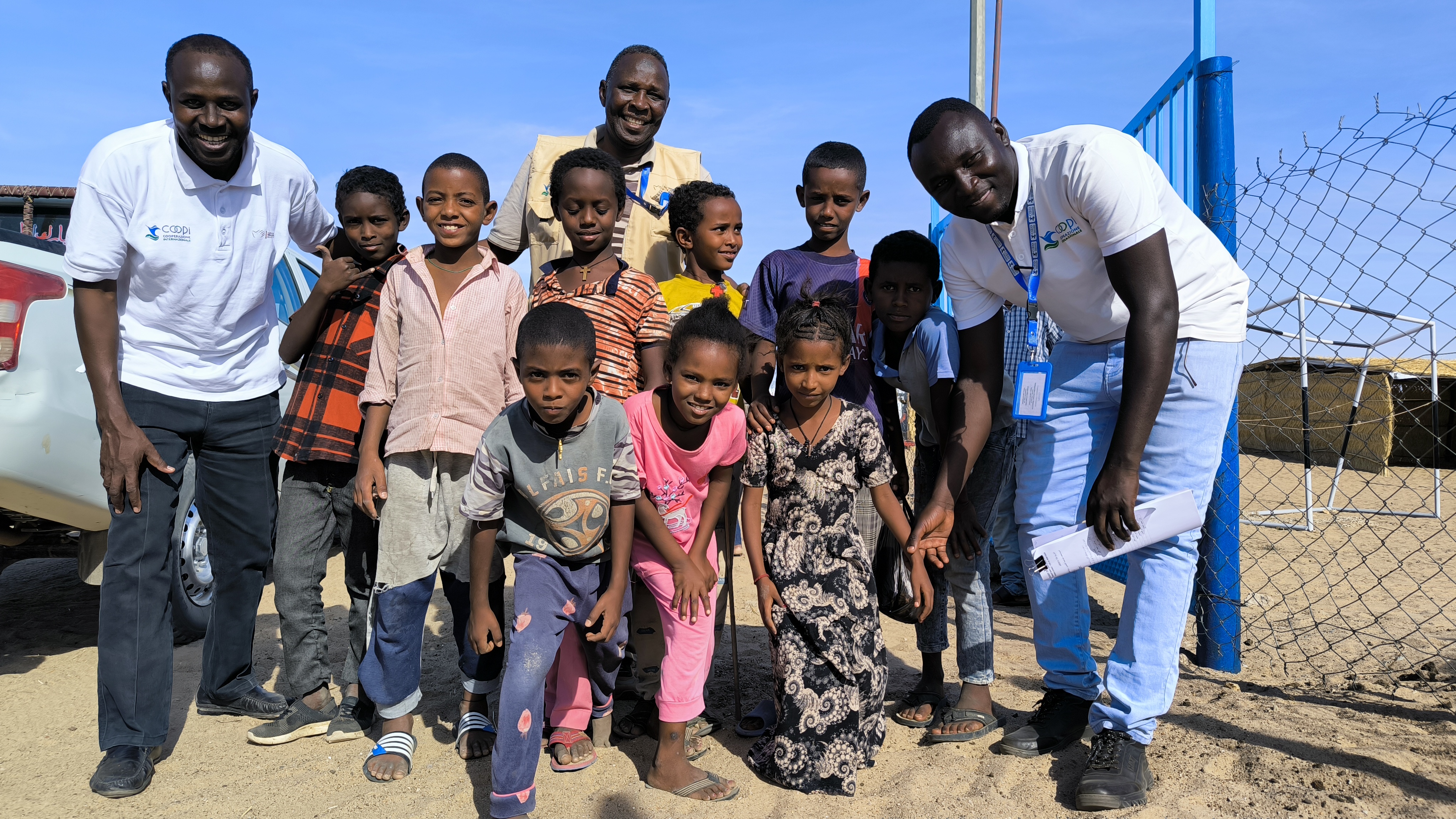 March 2024: Team COOPI Sudan mission at Tunaydbah refugee camp, Gedaref State, Sudan. The photo was taken at the Children's Friendly Space currently being rehabilitated by COOPI thanks to AICS funds.
March 2024: Team COOPI Sudan mission at Tunaydbah refugee camp, Gedaref State, Sudan. The photo was taken at the Children's Friendly Space currently being rehabilitated by COOPI thanks to AICS funds.
The training of the 40 women immediately changed the situation in the camps: we noticed more cleanliness in both camps. This is something we are very proud of!"
Zaccone confirms.
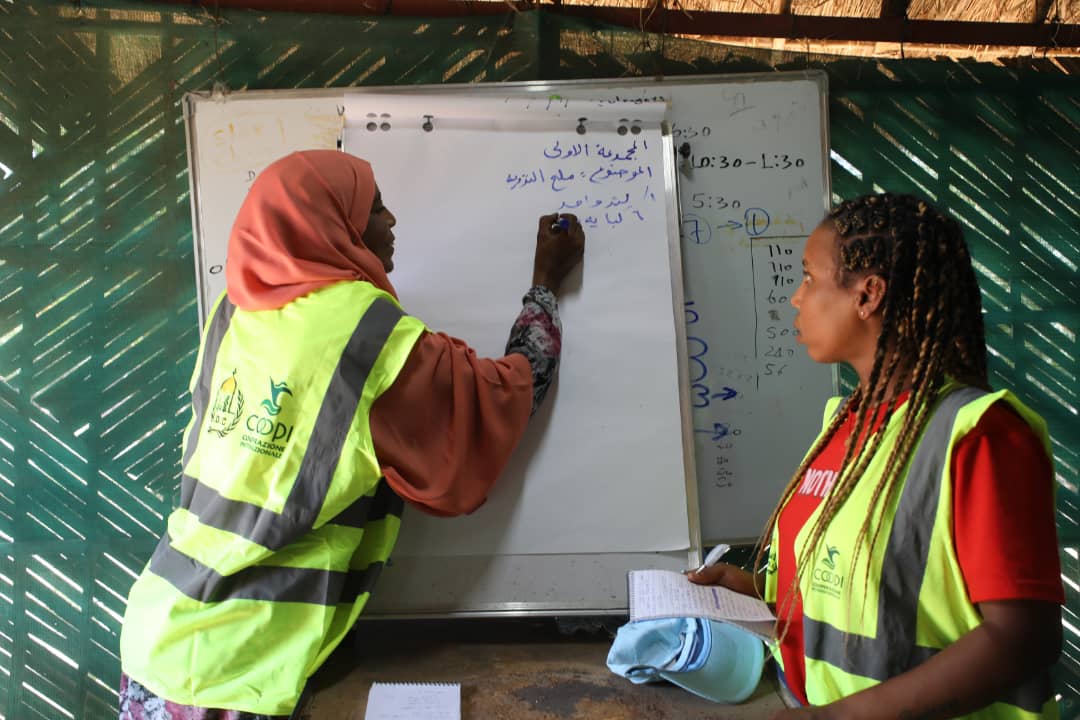
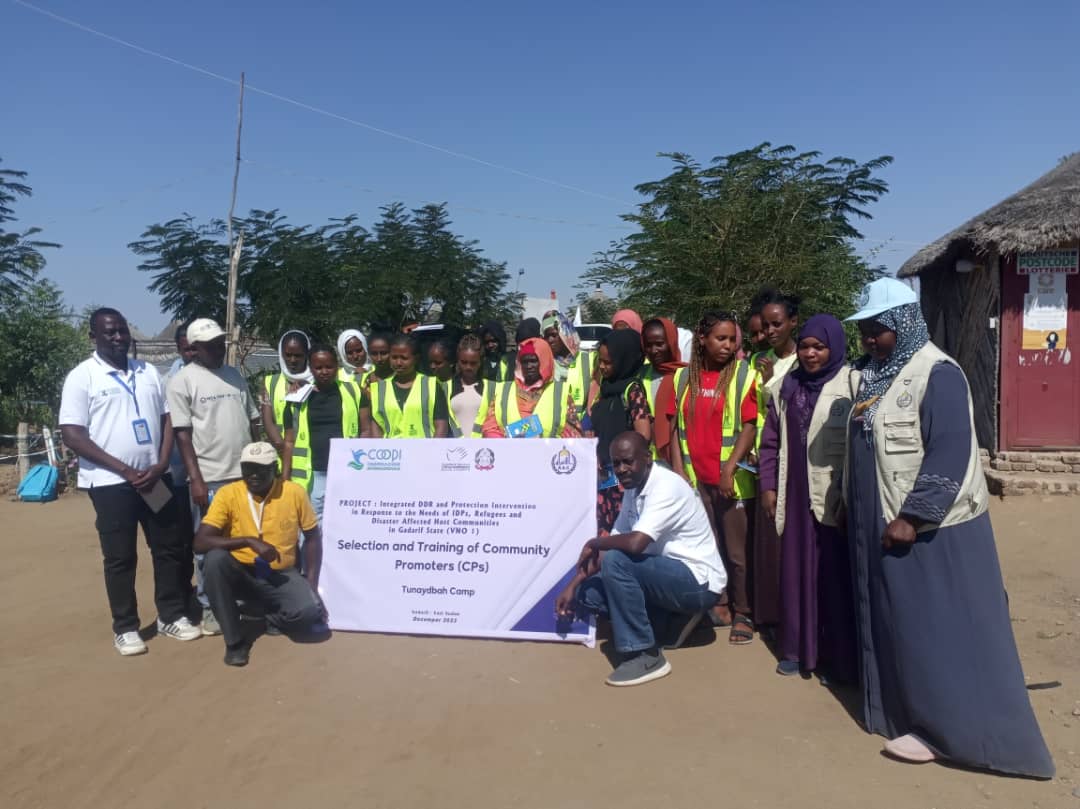
January 2024: Community Promoters training activities at Tunaydbah refugee camp. The training activity is implemented by Local Partner Elshraeg with technical support from COOPI staff and has 15 refugee women and 5 women from the host community as direct beneficiaries
But COOPI does not limit its efforts to training in good hygiene practices. The organization is working with local communities to build flood prevention barriers, which each year have devastating effects on the lives of thousands of families across the country, by purchasing and delivering technical equipment useful in such construction. Training activities on flood prevention and management techniques are carried out through the establishment of 5 Community Flood Management Committees (CFMCs), one for each village where the host community resides with displaced people. In addition, the project has seen workers engaged in cleaning drainage channels in the Tunaydbah camp, which helps drain water away from residential areas, thus reducing the risk of flooding.
Training and awareness-raising activities have already been carried out in other Sudanese cities by special Community Flood Management Committees (CFMCs) that we formed. The results have been incredible: by delivering technical materials, the committees were able to intervene promptly by helping thousands of families affected by flooding."
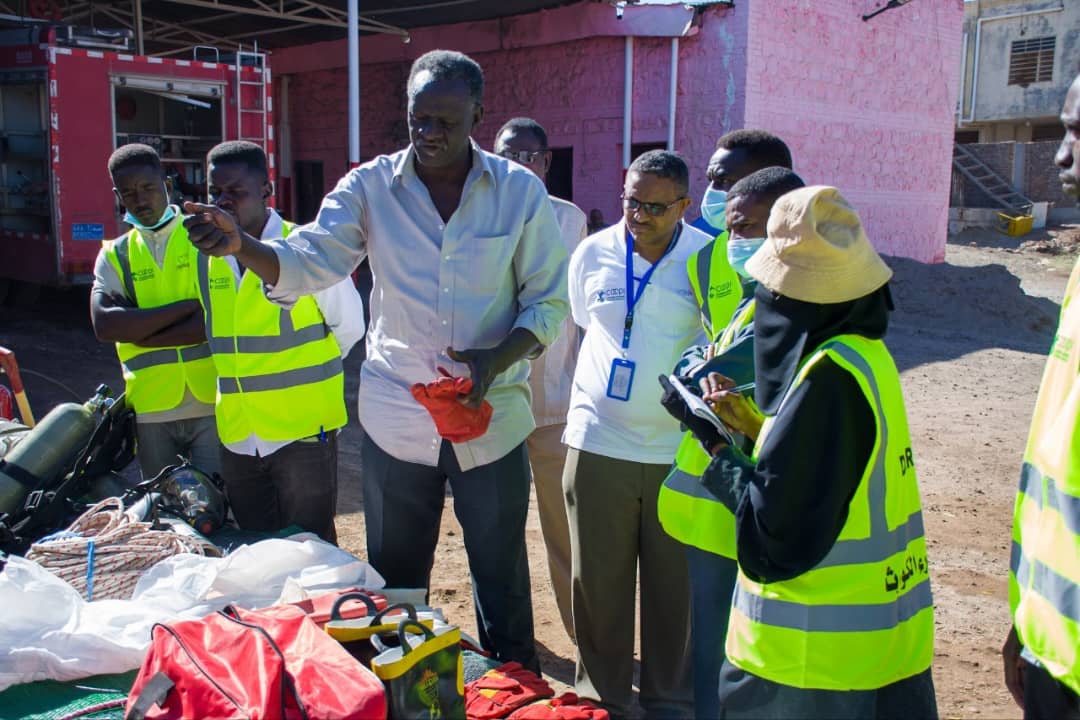
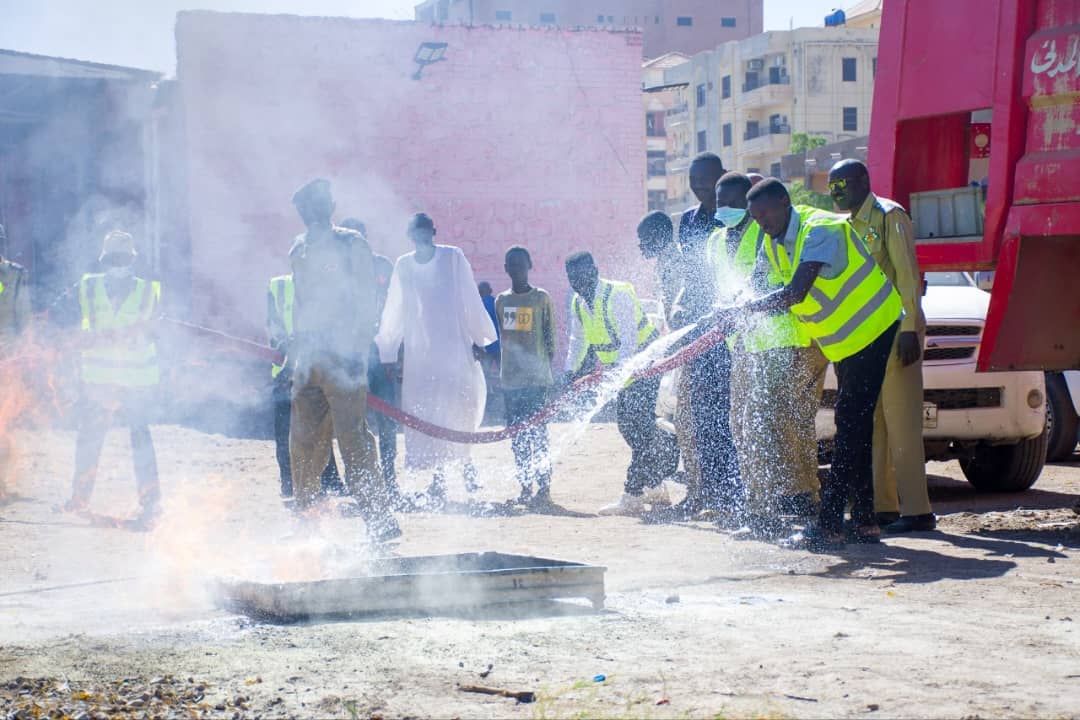
January 2024: Training of Community Flood Management Committees Disaster Risk Reduction Activities) organised by the COOPI team in collaboration with Civil Protection (AICS funding 12461)
As conflict persists and climate emergencies strain lives in the country, COOPI remains alongside displaced people, host communities and refugees through protection and disaster risk reduction operations. In Sudan, COOPI has been present since 2004 and has since implemented 110 projects, including 10 in the past year alone, supporting more than 4 million people in the areas of food, nutrition and water security, disaster risk reduction, protection, economic development and human rights protection. COOPI has a proven track record in the DRR and WASH sectors, the areas of focus of this project and other initiatives in Sudan that have matured over the years.
Ph. Eldesoge Sayed Mubarak Mohamed Nour
Cover photo: January 2024 - waste collection and management event implemented in the Tunaydbah refugee camp, Gedaref State, in the framework of the AICS funded project 12461. The activity was organised by the local partner ElShraeg, with technical support from COOPI staff.
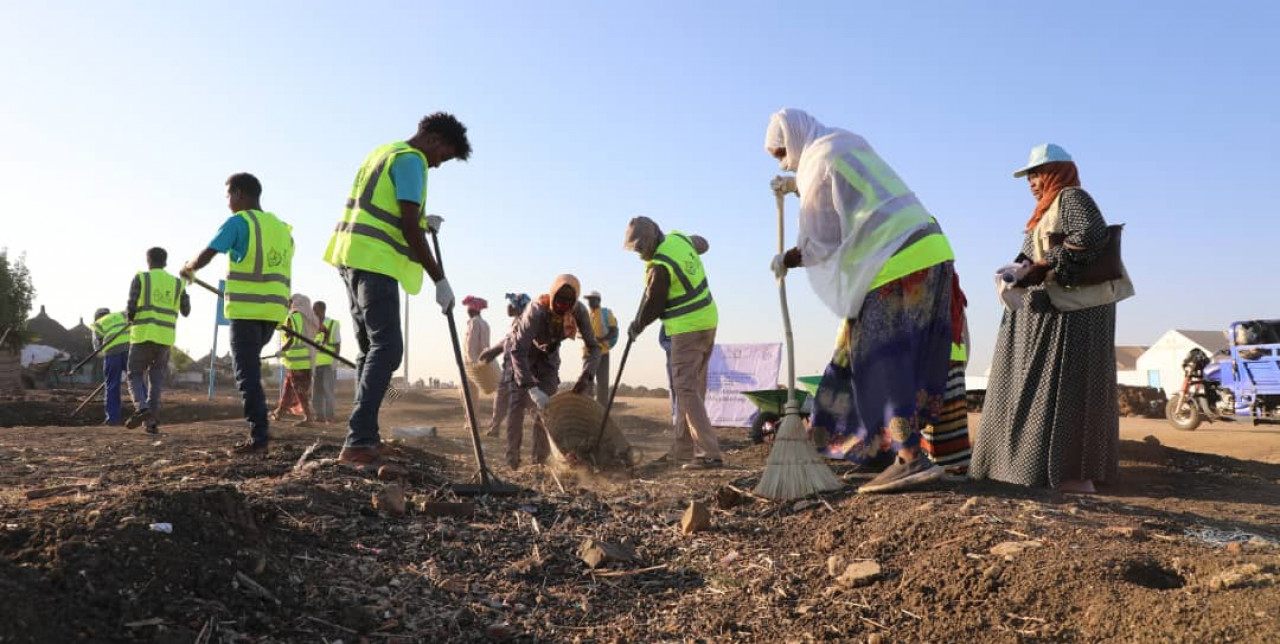



 Sudan
Sudan